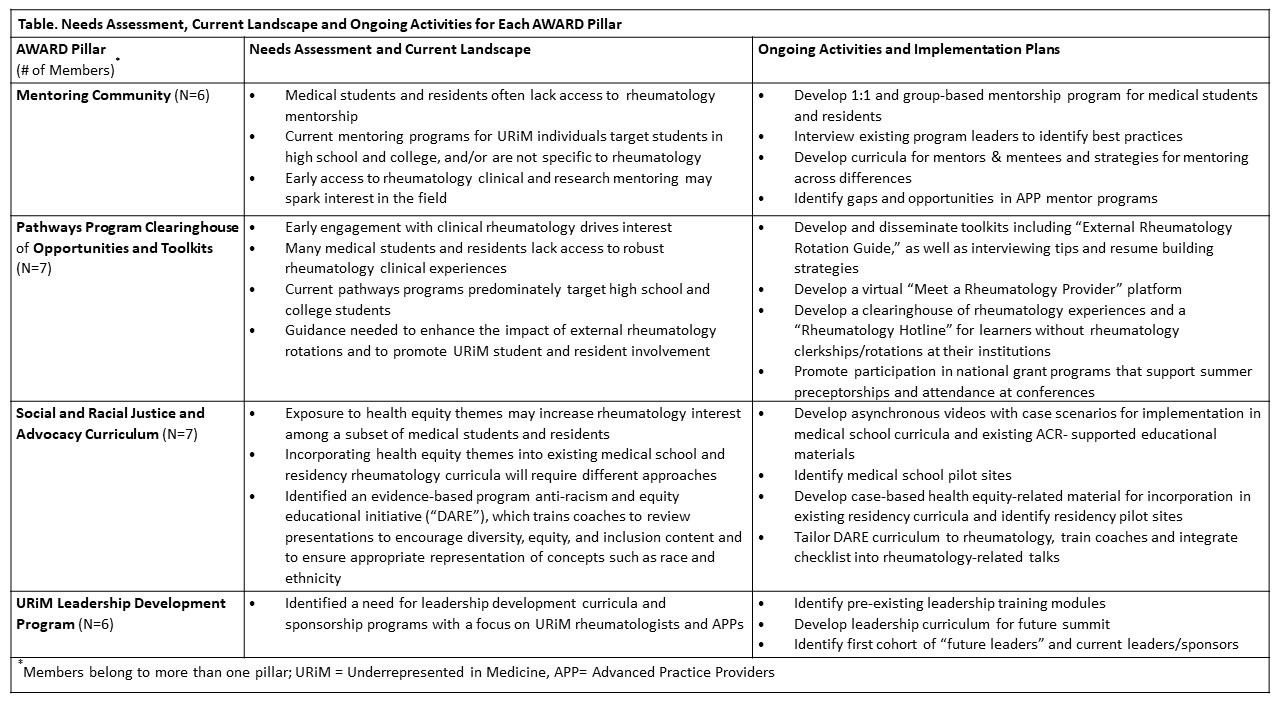Session Information
Session Type: Poster Session B
Session Time: 10:30AM-12:30PM
Background/Purpose: Workforce diversity enhances scientific inquiry and improves healthcare access and quality of care for minoritized populations. While other medicine subspecialties have increasing numbers of fellows identifying as underrepresented in medicine (URiM), the demographic composition of the adult and pediatric rheumatology and advance practice provider (APP) workforces has remained stagnant and is not reflective of the populations most affected by rheumatic conditions. We established a national Academy for Workforce Advancement to enrich Rheumatology Diversity (AWARD) to develop multimodal strategies to build racial and ethnic diversity in the pediatric and adult rheumatology and APP workforces.
Methods: We assembled 12 racially and ethnically diverse faculty and trainees (physicians, APPs, educators, students) from 8 institutions and national organizations with expertise in rheumatology, medical education, diversity, equity and inclusion, research, mentorship, pathway programs, and leadership. We established core domains (“pillars”), each led by a different AWARD member with relevant expertise. We considered interventions using consensus methods in large and smaller working group discussions. Pillar members conducted scoping surveys, and literature, and internet searches to assess existing resources, identify gaps, and develop goals, toolkits, and implementation processes.
Results: AWARD members agreed on four core pillars: 1) Mentoring Community, 2) Pathways Program Clearinghouse of Opportunities and Toolkits, 3) Social and Racial Justice and Advocacy Curriculum, and 4) URiM Leadership Program. Members of the mentoring pillar reviewed existing programs for URiM medical students, trainees, and APPs, developed an interview guide to obtain information about existing programs, and reviewed literature on mentorship pairing and training curricula. Pathways pillar members reviewed existing adult and pediatric rheumatology programs at AWARD-related institutions and Historically Black Colleges and Universities (HBCUs) and developed a rotation guide for URiM students, residents, and host programs. Curricular pillar members considered strategies to incorporate health equity concepts into medical and health professional education to enhance interest in rheumatology among URiM students and residents, and to implement an anti-racism and equity educational initiative checklist into rheumatology presentations. Leadership program members reviewed existing leadership training courses and identified potential leaders to serve as sponsors. All pillars identified gaps in URiM-focused initiatives to spark early interest in rheumatology and to facilitate leadership for URiM individuals in rheumatology and related APP fields (Table).
Conclusion: AWARD members have identified needs and opportunities within four pillars to build infrastructure and disseminate strategies to promote a more diverse rheumatology and APP workforce. Enhanced stakeholder engagement with national organizations and HBCUs is planned to pilot test materials and initiatives, with a goal for the national rollout of AWARD in the subsequent year.
To cite this abstract in AMA style:
Miloslavsky E, Sirek G, Chandler M, Ferrandiz R, Wright G, Iversen M, Solomon D, Katz J, Gravallese E, Ulysse S, Stone V, Kerr G, Feldman C. Development of the Academy for Workforce Advancement to Enrich Rheumatology Diversity [abstract]. Arthritis Rheumatol. 2024; 76 (suppl 9). https://acrabstracts.org/abstract/development-of-the-academy-for-workforce-advancement-to-enrich-rheumatology-diversity/. Accessed .« Back to ACR Convergence 2024
ACR Meeting Abstracts - https://acrabstracts.org/abstract/development-of-the-academy-for-workforce-advancement-to-enrich-rheumatology-diversity/

